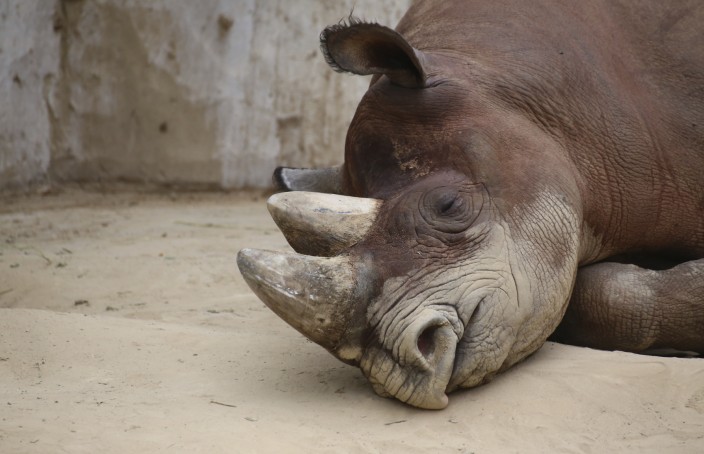There are only around 5,000 black rhinos in the world, down from 100,000 in the 1960s. Of these 5,000, 250 live in captivity, where they are kept safe from the poachers that target them for their horns.
But more and more captive black rhinos are being affected by a peculiar health problem: inflammation and insulin resistance. In other words, they are increasingly becoming prediabetic.
These are the findings of a new study published in General and Comparative Endocrinology. The research, which was led by Mandi Schook, associate research curator at Cleveland Metroparks Zoo, examined 86 captive and 120 wild black rhinos for key markers of insulin resistance. Every time, the captive rhinos had more signs of prediabetes than their wild counterparts. In fact, there was nothing to suggest that wild black rhinos are particularly at risk of insulin resistance at all.
It’s tempting to blame the zoos, to accuse them of triggering insulin resistance through unhealthy diets, but metabolism is more complex than that. We understand this in humans, and Pam Dennis believes that the veterinary world is beginning to follow suit, although we are only “scratching the surface” of understanding metabolism in animals. In other words, it isn’t simple a case of zoos feeding bad things to rhinos.
“We now recognise that obesity in humans leads to increased inflammation and a whole cascade of problems ranging from heart disease to immune dysfunction,” says Dennis.
“This is entering the vocabulary in zoo medicine, that obesity is much more than just a weight issue.”
That said, Dennis explains that the first step in fixing the problem will be dietary changes. Although the food given to black rhinos in zoos – which typically consists of grass, hay, fruit and vegetables – is of a high quality, it could be that there’s too much of it.
Or it could be that the naturally sedentary rhinos aren’t getting enough exercise. Even given ample space, they usually choose to recline in the shade. Particularly the males. Dennis recognises this problem:
“We need to work harder to ensure that they move around just like we need to work harder to ensure we move around,” said Dennis.
Whatever the solution, the problem has to be taken seriously:
“We know in other species, including humans, how to address inflammation and insulin resistance, primarily with diet and exercise,” Dennis says. “Can we apply some of that knowledge from other species to black rhinos to improve their care?
“Given their plight on the planet, we need to do something for each and every one of them. If we can help the ones we are caring for in zoos, that could make the difference for the species,”
It’s common for black rhinos to be beset with health concerns. Generally speaking, they aren’t the most robust bunch. African black rhinos have a much greater risk of anaemia, degraded muscle tissue, skin ulcers, liver disease, iron overload and low phosphate in the blood.
This is a huge concern to people like Pam Dennis; it’s threatening their future as a species. In one large, 70-year study of black rhinos living in North America, 73 per cent of the captive-born animals died before they could reproduce.
Hopefully, we’ll see a breakthrough in the research soon, before it’s too late for these majestic creatures.






